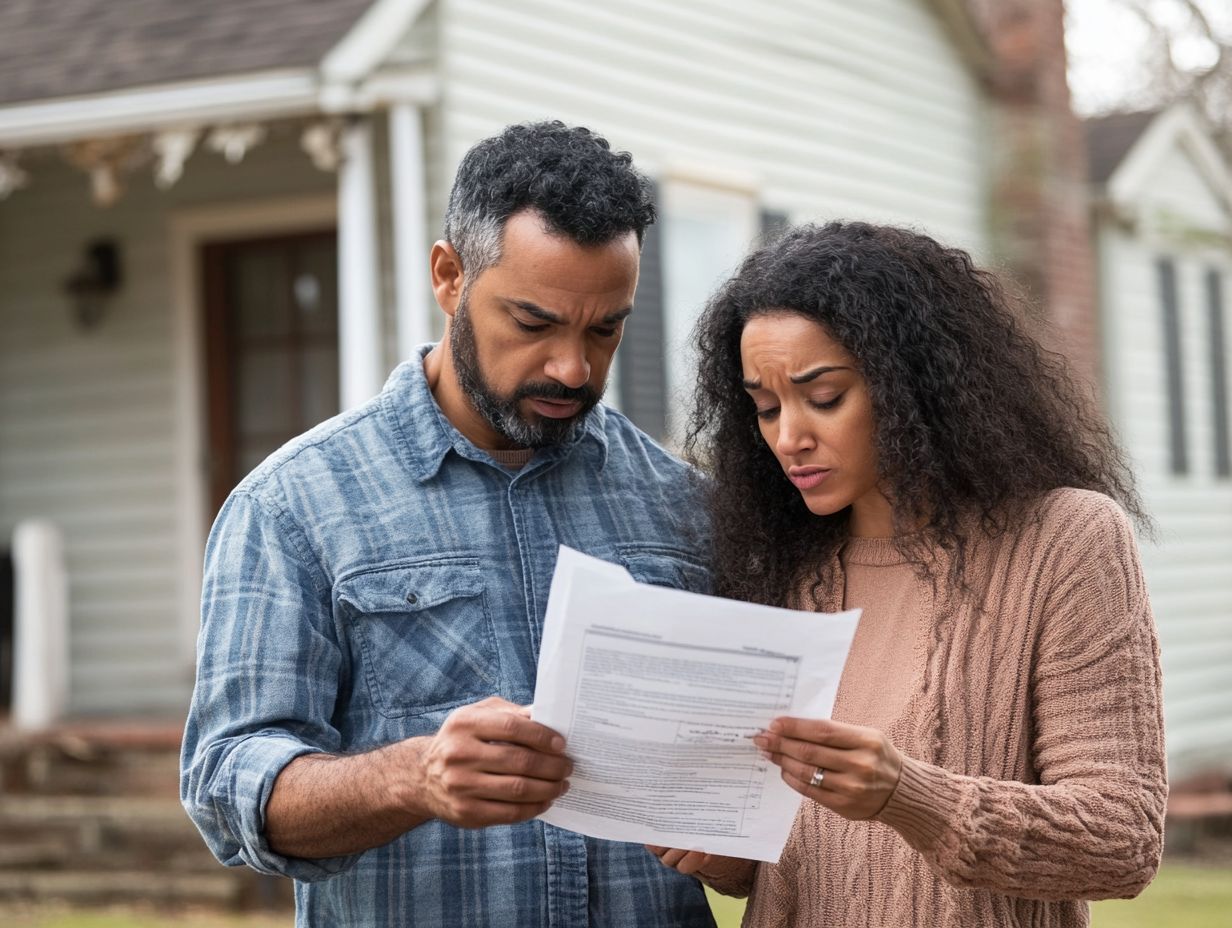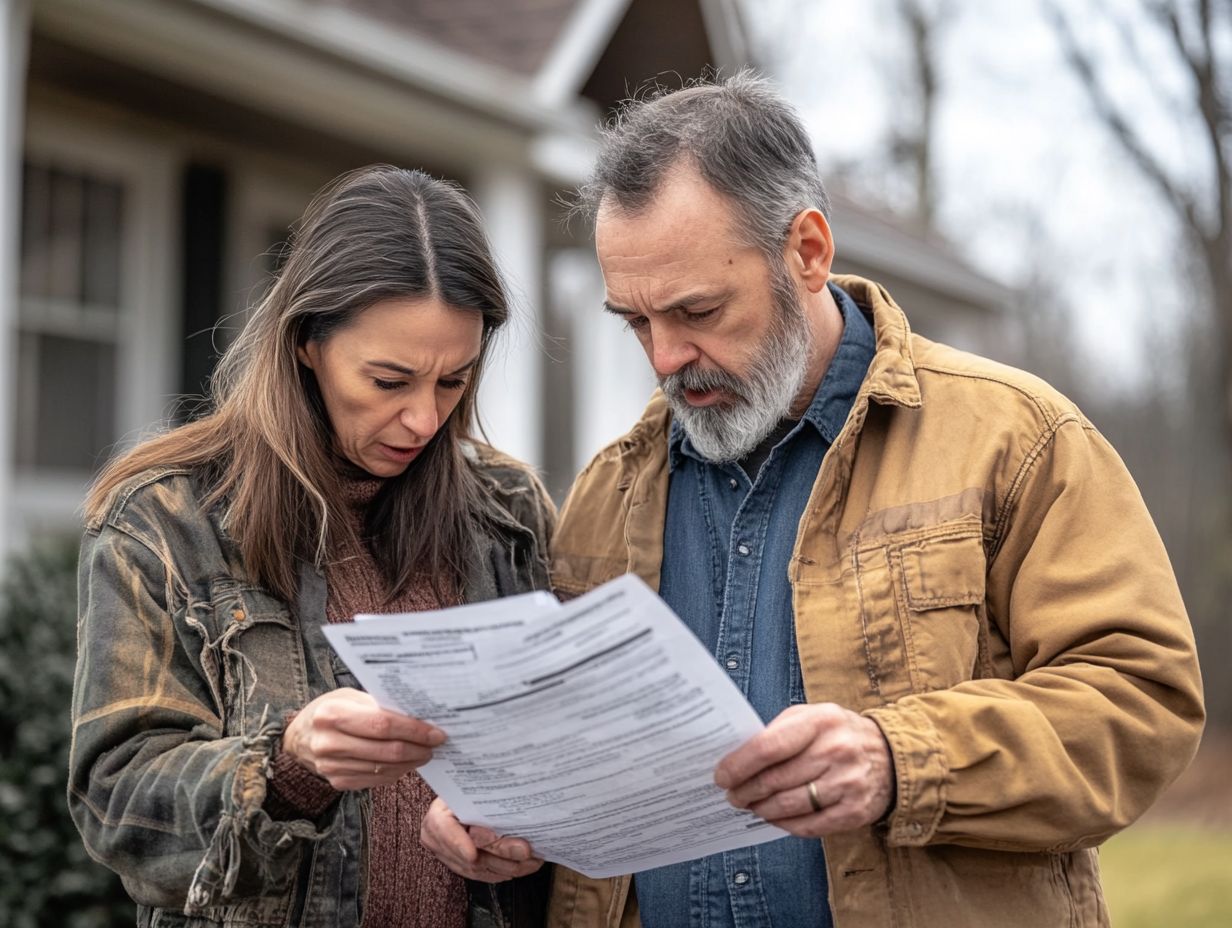5 Red Flags When Buying Your First Home
Buying your first home is exciting! It s filled with dreams and new beginnings. However, you need to navigate this journey carefully to avoid costly mistakes.
Keep an eye out for homes that sit on the market for too long or prices that seem unusually low. These can be warning signs of potential issues.
This article reveals five important red flags to watch for while house hunting. You ll learn how to make informed decisions and spot problems during viewings.
Get ready to equip yourself with the knowledge needed to find your dream home with confidence!
Contents
- Key Takeaways:
- 1. The House Has Been on the Market for a Long Time
- 2. The Price Seems Too Good to Be True
- 3. The Seller Is Not Willing to Negotiate
- 4. The Inspection Report Reveals Major Issues
- 5. The Neighborhood Is Not Ideal
- How to Avoid These Red Flags When Buying a Home?
- Frequently Asked Questions
- What are some red flags to watch out for when buying your first home?
- Why is a poor home inspection result a red flag?
- How can issues with the neighborhood or surrounding area be a red flag?
- Why should I be cautious of high property taxes when buying my first home?
- Is a rushed or pushy seller a red flag when buying my first home?
- Why are hidden fees or costs a red flag when buying my first home?
Key Takeaways:

Beware of low prices there might be hidden issues. A long time on the market could indicate problems. Negotiation is key; a seller unwilling to negotiate may not have your best interests in mind.
1. The House Has Been on the Market for a Long Time
If a house has been available for a while, it raises questions. There could be issues with its condition or pricing that you need to know about.
Properties that stay unsold can become stigmatized, affecting your perception as a buyer. Investigate the history of the listing to uncover the seller s motivation.
2. The Price Seems Too Good to Be True
A low price often hides serious concerns. Adopt a buyer beware mindset as you examine the property carefully.
Be alert for red flags like:
- Visible structural issues
- Musty odors indicating dampness
- Poorly done DIY repairs
Understanding property value means looking beyond the price tag. A professional inspector can help uncover hidden problems that could lead to big expenses later.
3. The Seller Is Not Willing to Negotiate
A seller who won t budge on price may be overly confident in the property or there could be issues you don t see. This inflexibility can be a major red flag during negotiations.
Stay alert and consider working with a knowledgeable REALTOR . They can provide valuable insights and help you navigate potential pitfalls confidently!
4. The Inspection Report Reveals Major Issues
A home inspection can reveal serious problems like structural issues, faulty plumbing, or electrical failures. These issues may lead to costly repairs and are a red flag for buyers.
This vital assessment highlights potential expenses and concerns affecting a home’s comfort. For example, an aging HVAC system, which stands for heating, ventilation, and air conditioning, may struggle to maintain a cozy environment.
Foundation cracks could jeopardize the building’s integrity. You must also be aware of the threat of pest infestations, especially termites, which can inflict serious damage if left unchecked.
Understanding the inspection report is key. It provides clarity on each issue’s severity and potential repercussions.
By making informed decisions based on these findings, you can save both time and money in the long run, ensuring that your investment in the property is both sound and secure.
5. The Neighborhood Is Not Ideal

An undesirable neighborhood can dramatically impact property values and the overall buying experience. It is essential to engage in thorough neighborhood sleuthing before finalizing your decision.
As a prospective homeowner, evaluate various aspects of the neighborhood, such as its proximity to essential local amenities like grocery stores, schools, and parks. These features enhance your daily convenience and overall lifestyle.
Assess safety statistics, including crime rates and the presence of neighborhood watch programs, to ensure peace of mind. Don’t overlook environmental conditions; standing water might signal drainage problems, while properties lacking adequate ventilation could pose health risks.
These factors will play a crucial role in your happiness as a homeowner and influence your home’s future resale value. Understand how these elements contribute to your immediate living experience and the investment potential of your future home.
How to Avoid These Red Flags When Buying a Home?
Navigating the buyer’s journey demands vigilance and awareness of homebuyer red flags that could point to serious repair issues. Knowing what to look for in your first home can help you avoid costly fixes and unexpected challenges later on.
However, you can mitigate these risks through thorough inspections and a solid home warranty. Prioritize getting a professional inspection to ensure a smooth transaction. This step can reveal hidden problems that might not be immediately obvious, saving you from significant financial burdens.
Keep an eye out for signs of wear, such as water stains or cracks in the walls; these can indicate underlying issues that deserve further investigation. Understanding what a home warranty covers can offer you peace of mind, as it may take care of essential repairs once you finalize the purchase.
By staying proactive throughout the home buying process, you can safeguard your investment and significantly reduce the likelihood of encountering unpleasant surprises.
What Are the Key Factors to Consider When Buying a Home?
When you re purchasing a home, it s vital to consider key factors like the overall condition of the property, including the electrical systems and plumbing, as well as the availability of a home warranty. These elements are crucial for making a worthwhile investment.
Conduct thorough inspections to reveal known defects, such as water damage or outdated appliances, which might not be immediately apparent. Don t overlook long-term maintenance considerations, like the condition of the roof or the age of the HVAC system. These aspects greatly impact the property s longevity and functionality.
By carefully evaluating these factors, you can steer clear of unexpected repair costs that could emerge after the purchase. This proactive approach ultimately protects your financial interests and paves the way for a more successful homeownership experience.
Stay proactive and informed to make the best choices for your future home!
What Are Some Warning Signs to Look Out for During a Home Viewing?
During a home viewing, remain vigilant for signs of trouble. Look for a moldy smell, damaged walls, and red flags to look for in home inspections, such as signs of fresh paint.
These can indicate concealed issues or recent cover-ups. Pay attention to the flooring condition.
Uneven surfaces can suggest foundational problems that should be addressed.
Step outside and check for poor drainage. Standing water near the property can lead to significant issues over time.
Engage the seller or agent in conversation. Ask informed questions about the home s history and any repairs.
Caution and curiosity can help you avoid costly surprises.
How Can a Real Estate Agent Help Identify Red Flags?
A knowledgeable real estate agent can help you spot red flags during the home buying process. They guide you through property values and potential hidden defects, and can provide valuable insights, including tips for first-time home buyer negotiations.
By analyzing home inspection results, a seasoned agent can identify issues that may escape notice, like subtle signs of water damage.
They act as your advocate, negotiating repairs based on the inspection findings. Their understanding of local regulations ensures you make informed decisions.
Having a dedicated professional helps safeguard your investment and secure a safe home.
What Are Some Common Mistakes First-Time Home Buyers Make?

First-time home buyers often face common traps. They may underestimate repair costs or overlook necessary DIY projects. Recognizing the 5 signs you are ready to buy a home can help navigate these challenges.
Neglecting thorough inspections can mean missing critical red flags, like water damage. It’s easy to focus on aesthetic upgrades while ignoring underlying issues.
To navigate these pitfalls, arm yourself with knowledge. Research local market trends and consult experienced agents for insights.
Educating yourself on both emotional and practical aspects helps you make informed decisions and sidestep common missteps.
How Can One Ensure a Smooth Home Buying Process?
To ensure a smooth buying experience, immerse yourself in research. Secure a professional inspection and consider a home warranty.
Prioritize financial planning; understanding your budget refines your options and minimizes stress. Collaborate with trusted professionals for valuable insights.
Thorough inspections uncover potential issues and provide bargaining leverage. Stay sharp about your due diligence to ensure a successful purchase!
Frequently Asked Questions
What are some red flags to watch out for when buying your first home?
Some potential red flags to keep an eye out for when purchasing your first home include poor home inspection results, issues with the neighborhood or surrounding area, high property taxes, a rushed or pushy seller, and hidden fees or costs.
Why is a poor home inspection result a red flag?

A poor home inspection can mean serious safety issues or unexpected repairs. Always review the inspection report and discuss major concerns with the seller before moving forward.
How can issues with the neighborhood or surrounding area be a red flag?
Neighborhood problems can affect your comfort and the property’s future value. Watch for high crime rates, noisy neighbors, or poor access to amenities.
Why should I be cautious of high property taxes when buying my first home?
High property taxes can dramatically raise your monthly payments. Check the average tax rates in the area to avoid budget surprises.
Is a rushed or pushy seller a red flag when buying my first home?
A rushed seller might be trying to hide something. Take your time to review everything before making a decision.
Hidden costs can inflate the price of your new home. Always read the documents carefully and ask about any unclear fees.






